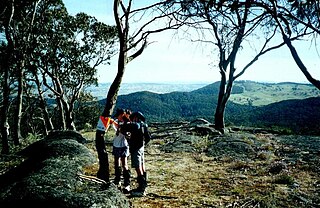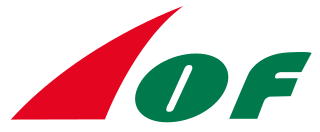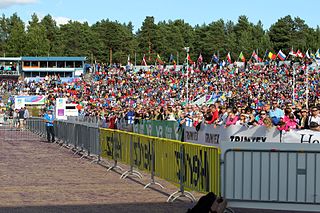
Cheerleading is an activity in which the participants cheer for their team as a form of encouragement. It can range from chanting slogans to intense physical activity. It can be performed to motivate sports teams, to entertain the audience, or for competition. Cheerleading routines typically range anywhere from one to three minutes, and contain components of tumbling, dance, jumps, cheers, and stunting. Cheerleading originated in the United States, where it has become a tradition. It is less prevalent in the rest of the world, except via its association with American sports or organized cheerleading contests.

Orienteering is a group of sports that involve using a map and compass to navigate from point to point in diverse and usually unfamiliar terrain whilst moving at speed. Participants are given a topographical map, usually a specially prepared orienteering map, which they use to find control points. Originally a training exercise in land navigation for military officers, orienteering has developed many variations. Among these, the oldest and the most popular is foot orienteering. For the purposes of this article, foot orienteering serves as a point of departure for discussion of all other variations, but almost any sport that involves racing against a clock and requires navigation with a map is a type of orienteering.

Rogaining is an orienteering sport of long distance cross-country navigation, involving both route planning and navigation between checkpoints using a variety of map types. In a rogaine, teams of two to five people choose which checkpoints to visit within a time limit with the intent of maximising their score. Teamwork, endurance, competition and an appreciation for the natural environment are features of the sport. Championship rogaines are 24 hours long, but rogaines can be as short as two hours.

The International Orienteering Federation (IOF) is the international governing body of the sport of orienteering. The IOF head office is located in Karlstad, Sweden. The IOF governs four orienteering disciplines: foot orienteering, mountain bike orienteering, ski orienteering, and trail orienteering.

The World Orienteering Championships is an international orienteering competition which has been organized by the International Orienteering Federation (IOF) since 1966. The World Orienteering Championships is considered to be the most prestigious competition in competitive orienteering. The races are contested between members of the IOF, which are each aligned to a National Olympic Committee.

The Junior World Orienteering Championships (JWOC) are an annual orienteering competition. They were first held in 1990. Entry is open to national teams aged 20 and below as of 31 December in the year of competition. Representative countries must be members of the International Orienteering Federation (IOF).
The Canadian soccer league system, also called the Canadian soccer pyramid, is a term used in soccer to describe the structure of the league system in Canada. The governing body of soccer in the country is the Canadian Soccer Association (CSA), which oversees the system and domestic cups but does not operate any of its component leagues. In addition, some Canadian teams compete in leagues that are based in the United States.

The Canadian Championship is an annual soccer tournament contested by Canadian professional teams. The winner is awarded the Voyageurs Cup and a berth in the CONCACAF Champions Cup. It is contested by Major League Soccer sides Toronto FC, Vancouver Whitecaps FC, and CF Montréal, eight Canadian Premier League sides, and the champions of League1 Ontario, League1 British Columbia, and Ligue1 Québec. The tournament is organized by the Canadian Soccer Association and has been broadcast on OneSoccer since 2019.

The International Ice Hockey Federation is a worldwide governing body for ice hockey. It is based in Zurich, Switzerland, and has 84 member countries.
The Orienteering World Cup is a series of orienteering competitions organized annually by the International Orienteering Federation. Two unofficial cups were organized in 1983 and 1984. The official World Cup was held first in 1986, and then every second year up to 2004. From 2004 the World Cup has been held annually.
The history of orienteering begins in the late 19th century in Sweden, where it originated as military training. Over the course of the late 19th and early 20th century, orienteering emerged first as a military competition in Nordic countries and then as a mass participation sport, before becoming a competitive sport with an international governing body.
The Norwegian Orienteering Federation is the national Orienteering Association in Norway. It is recognized as the orienteering association for Norway by the International Orienteering Federation, of which it is a member. The association was founded 1 October 1945, and is a member of the Norwegian Confederation of Sports (NIF). Its first chairman was Kaare Thuesen. In 1946 NOF had 204 associated clubs, with just above 7,000 members. The number of clubs and associated members increased gradually through the 1950s, 1960s and 1970s, and peaked in 1984 with 630 clubs and 34,000 members, and 35,000 members and 620 clubs in 1985. The next twenty years saw a decline in the number of clubs and members. As per December 2007 Norges Orienteringsforbund had 400 associated clubs and just above 24,000 members, distributed over eighteen districts.

Foot orienteering is the oldest formal orienteering sport, and the one with the most "starts" per year. Usually, a FootO is a timed race in which participants start at staggered intervals, are individually timed, and are expected to perform all navigation on their own. The control points are shown on the orienteering map and must be visited in the specified order. Standings are determined first by successful completion of the course, then by shortest time on course.

The Canadian national netball team is the national netball team of Canada. Canada has both men's and women's national teams. Netball Canada is Canada's national governing body for the sport. The national team was first formed in the latter half of the 20th century.
Underwater orienteering, also known as scuba orienteering is an underwater sport that uses recreational open circuit scuba diving equipment and consists of a set of individual and team events conducted in both sheltered and open water testing the competitors' competency in underwater navigation. The competition is principally concerned with the effectiveness of navigation technique used by competitors to swim an underwater course following a route marked on a map prepared by the competition organisers, a compass and a counter meter to measure the distance covered. The sport was developed in the Soviet Union during the late 1950s and is played mainly in Europe. It is known as Orientation Sub in French and as La Orientación Subacuática in Spanish. Historically, the sport has also been known as Technical Disciplines.
The World Ringette Championships (WRC) is the premier international competition in ringette and is governed by the International Ringette Federation (IRF). Unlike most international competitions, all of the WRC's elite athletes are female rather than male, one of the sport's distinctive features. Competing nations include: Canada, Finland, United States, Sweden, Slovakia and the Czech Republic, with Team Canada and Team Finland having emerged as the sport's top two competing nations. The 2023 World Ringette Championships were held in Calgary, Alberta, Canada and was the sport's 60th anniversary.
The World Masters Orienteering Championships (WMOC) (formerly the Veteran World Cup) is an annual orienteering competition organized by the International Orienteering Federation (IOF).

The 2020 World Figure Skating Championships were scheduled to be held in Montreal, Quebec, Canada, from March 16 to March 22, 2020. Figure skaters would have competed for the title of world champion in men's singles, ladies' singles, pairs, and ice dance. This would have been the first time that Montreal hosted the World Figure Skating Championships since 1932. The competition was supposed to determine the entry quotas for each federation at the 2021 World Championships.

The North American Orienteering Championships (NAOC) is a biennial orienteering event organized by the International Orienteering Federation.

League1 Canada is a national pro–am soccer organization in Canada. It consists of four regional leagues; League1 Alberta, League1 British Columbia, League1 Ontario, and Ligue1 Québec with each league operating men's and women's divisions. L1C is overseen by Canada Soccer Business, in partnership with participating provincial member federations.












